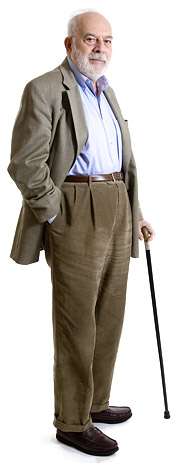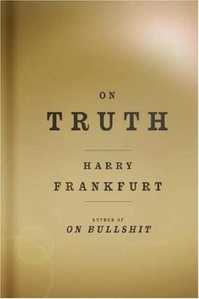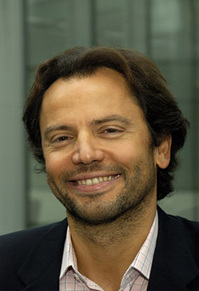
“Harry G. Frankfurt.” Source of caption and photo: online version of the NYT article quoted and cited below.
(p. 29) Q: Your new book, “On Truth,” is a sequel to “On Bull–,” a slim philosophical tract published by Princeton University Press that became an accidental best seller last year.
What do you mean by accidental? People didn’t know they were buying it?
. . .
In your new book, you are especially critical of academics and their theories of postmodernism, which treat all truth as an artificial construction as opposed to an independent reality.
I used to teach at Yale, which was at one time a center of postmodernist literary theory. Derrida was there. Paul de Man was there. I originally wrote the bull– essay at Yale, and a physics professor told me that it was appropriate that this essay should have been written at Yale, because, after all, he said, Yale is the bull– capital of the world.
But there is probably far more bull– in politics and entertainment than in academia.
I hope so!
What about in philosophy, which you still teach?
I think there is a certain amount of bull– in philosophy — people pretending to have important ideas when they don’t and obscuring the fact by using a lot of impenetrable language.
For the full interview, see:
DEBORAH SOLOMON. “Questions for Harry G. Frankfurt; Fighting Bull .” The New York Times, Magazine Section (Sun., October 22, 2006): 29.
(Note: ellipsis added; bold in original print version, to indicate questions by Deborah Solomon.)
The reference to the first book is:
Frankfurt, Harry G. On Bullshit. Princeton, NJ: Princeton University Press, 2005.
The reference to the sequel is:
Frankfurt, Harry G. On Truth. New York: Alfred A. Knopf, 2006.


Source of book image on left: http://2.bp.blogspot.com/_T_py15A4TNY/SI9o5-lJ-3I/AAAAAAAAABc/ui9BmdO4Dns/s400/On+Bullshit.jpg
Source of book image on right: http://www.coverbrowser.com/image/bestsellers-2006/509-1.jpg






